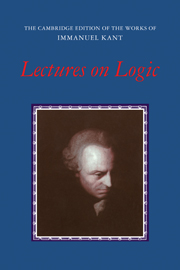Book contents
- Frontmatter
- Contents
- General editors' preface
- Acknowledgments
- Translator's introduction
- PART I The Blomberg logic
- Introduction to the doctrine of reason according to the thoughts of Professor Kant
- Introduction to the doctrine of reason according to the Author
- The doctrine of reason itself: The first principal part
- The doctrine of reason itself: The second principal part
- The doctrine of reason itself: The third principal part
- The doctrine of reason itself: The fourth principal part
- PART II
- PART III The Dohna-Wundlacken logic
- PART IV The Jäsche logic
- PART V Appendixes
- Explanatory notes
- Name index
- Subject index
Introduction to the doctrine of reason according to the thoughts of Professor Kant
Published online by Cambridge University Press: 05 June 2012
- Frontmatter
- Contents
- General editors' preface
- Acknowledgments
- Translator's introduction
- PART I The Blomberg logic
- Introduction to the doctrine of reason according to the thoughts of Professor Kant
- Introduction to the doctrine of reason according to the Author
- The doctrine of reason itself: The first principal part
- The doctrine of reason itself: The second principal part
- The doctrine of reason itself: The third principal part
- The doctrine of reason itself: The fourth principal part
- PART II
- PART III The Dohna-Wundlacken logic
- PART IV The Jäsche logic
- PART V Appendixes
- Explanatory notes
- Name index
- Subject index
Summary
All our cognitions are acquired
through experience
through our own practice and
through instruction.
From learning arises the spirit of imitation. This learning happens in childhood. There is of course a certain skill that one brings about for oneself through imitation; but he who imitates shows the least degree of capacity.
The first origin of our cognitions is empirical. Many things arise through imitation and many cognitions through imitation.
We see what others have shown us and we imitate.
The 2nd kind is the practice of our acquired skill. Through frequent employment of our insights and talents we attain a greater cognition and new insights, and these can be increased still further by means of our own experience.
The last thing is to attain a cognition through universal rules[;] these are derived from reason.
The first method of attaining cognitions must be abandoned just as soon as the capacities achieve a faculty of cultivating themselves. One must seek to think for oneself, to judge for oneself.
This kind of practice with our capacities demands the very same degree, even if one thinks in opposition to what others have thought.
The natural understanding has its own laws, according to which alone it can proceed. These are called natural laws.
- Type
- Chapter
- Information
- Lectures on Logic , pp. 5 - 14Publisher: Cambridge University PressPrint publication year: 1992
- 1
- Cited by

